Raw Talent, Method Intensity and Surprise Compliments: ‘1992’ Cast Remembers Ray Liotta
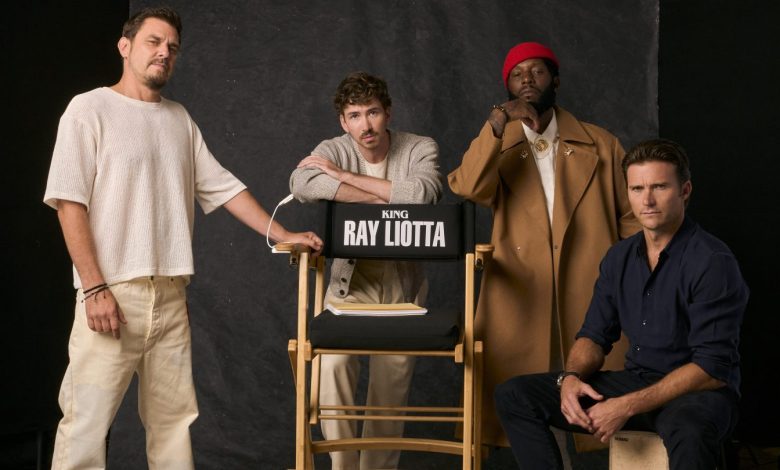
“Quiet on set, please,” Tyrese Gibson asks to a room filled with nearly a dozen studio and publicity insiders on a recent August afternoon at the Four Seasons. Gibson and his collaborators on Lionsgate‘s new crime thriller 1992 have reached the final slot on their junket schedule, and the veteran star is trying to match the mood to the moment. It’s their first and last group photo shoot and interview, and Gibson, Scott Eastwood, Dylan Arnold and their director Ariel Vromen are gathering around an empty chair with the name “King Ray Liotta” printed in bold white lettering on black canvas.
The tribute to the late acting icon — Liotta passed away unexpectedly in his sleep in May 2022 at age 67 while on location shooting a film in the Dominican Republic — is accessorized with a copy of the script, written by Vromen and Sacha Penn, and a small reading light attached to armrest. The actors know the accoutrements well. They would often arrive to the film’s set in Bulgaria to find Liotta sequestered in a dark corner of the studio alone, poring over the script, his face visible only by the bulb from a tiny reading light. Most dare not approach him as Liotta went Method to play Lowell, a ruthless leader of a local crime ring in Los Angeles intent on stealing a fortune of black market catalytic converters.
Liotta’s chair. Leo Jacob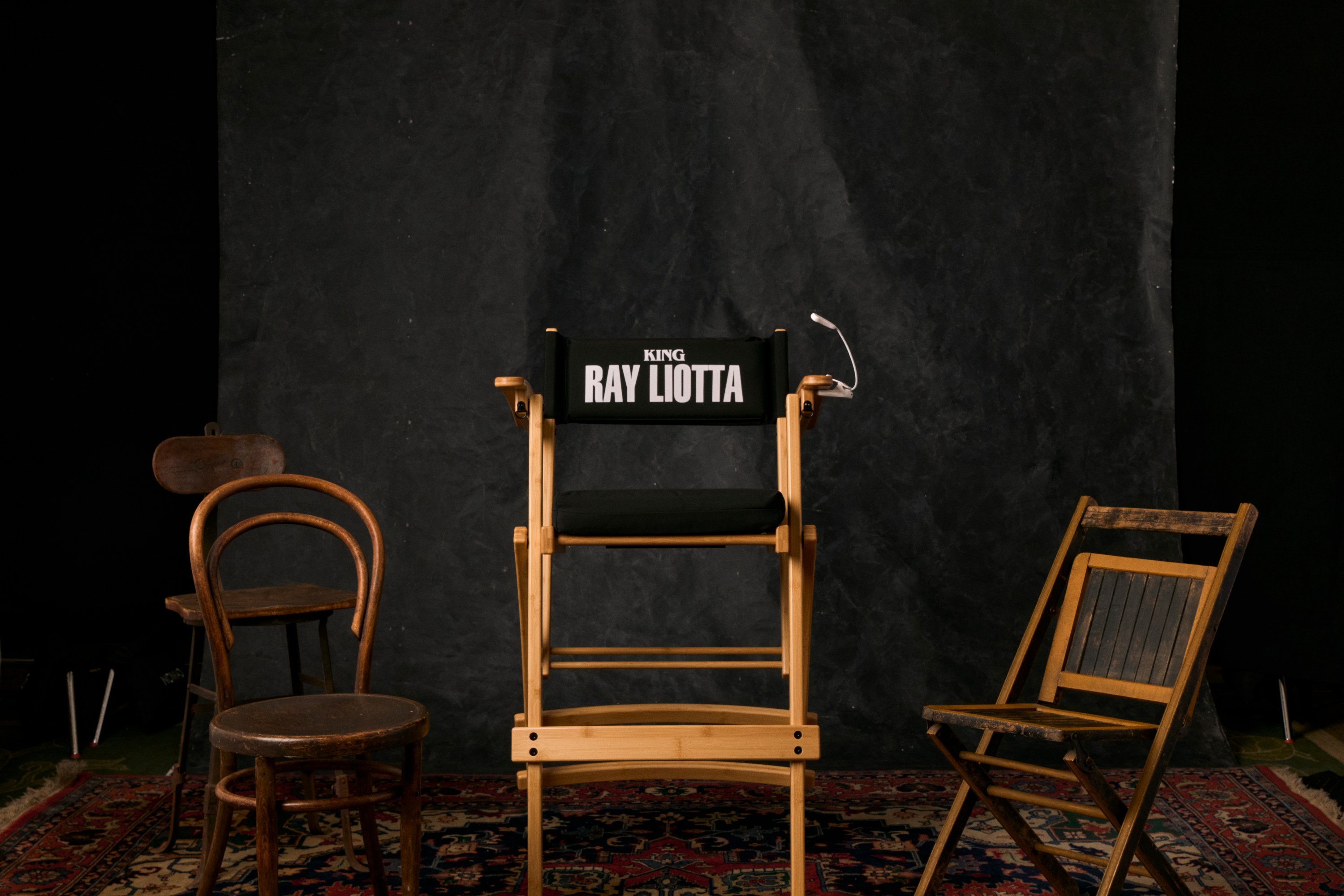
Executive produced by Snoop Dogg, 1992 follows Gibson’s Mercer as he tries to rebuild his life and mend a broken relationship with his son, played by Christopher A’mmanuel, after being released from a lengthy prison stay. Against the backdrop of 1992’s Los Angeles riots that took place following the shocking Rodney King verdict, Mercer and his son come face to face with Lowell’s team as they attempt to rob the same factory where Mercer works. Eastwood and Arnold star as the offsprings of Liotta’s character, two sons who are conflicted about following in their father’s troubling footsteps. 1992 hits theaters Aug. 30.
Because of his hectic work schedule, Liotta has had a number of projects come out following his death including the series Black Bird and features Cocaine Bear, Fool’s Paradise and Dangerous Waters. But 1992 represents the final big-screen outing of a legendary career that dates back to the early 1980s and features stand-out turns in movies like Martin Scorsese’s Goodfellas, Jonathan Demme’s Something Wild, Phil Alden Robinson’s Field of Dreams, and many others. “He played such iconic characters in movies,” Eastwood tells The Hollywood Reporter. “Revisiting his work is like watching history play out before your eyes. We lost him too early.”
Because he’s gone, that has left the 1992 team with the task of striking the right tone in supporting their film while remembering their friend. “We’ve all promoted movies before, it’s what comes with our world. But we started to think about how we could do something to honor the sensitivities of this situation and find a balance of paying our love and respects, and tell stories but not appear gimmicky or that we’re trying to milk anything,” Gibson explains. “This was our best way of wanting his presence to be felt.”
Arnold, Eastwood, Gibson and Vromen at the Four Seasons Los Angeles at Beverly Hills on Aug. 12. Leo Jacob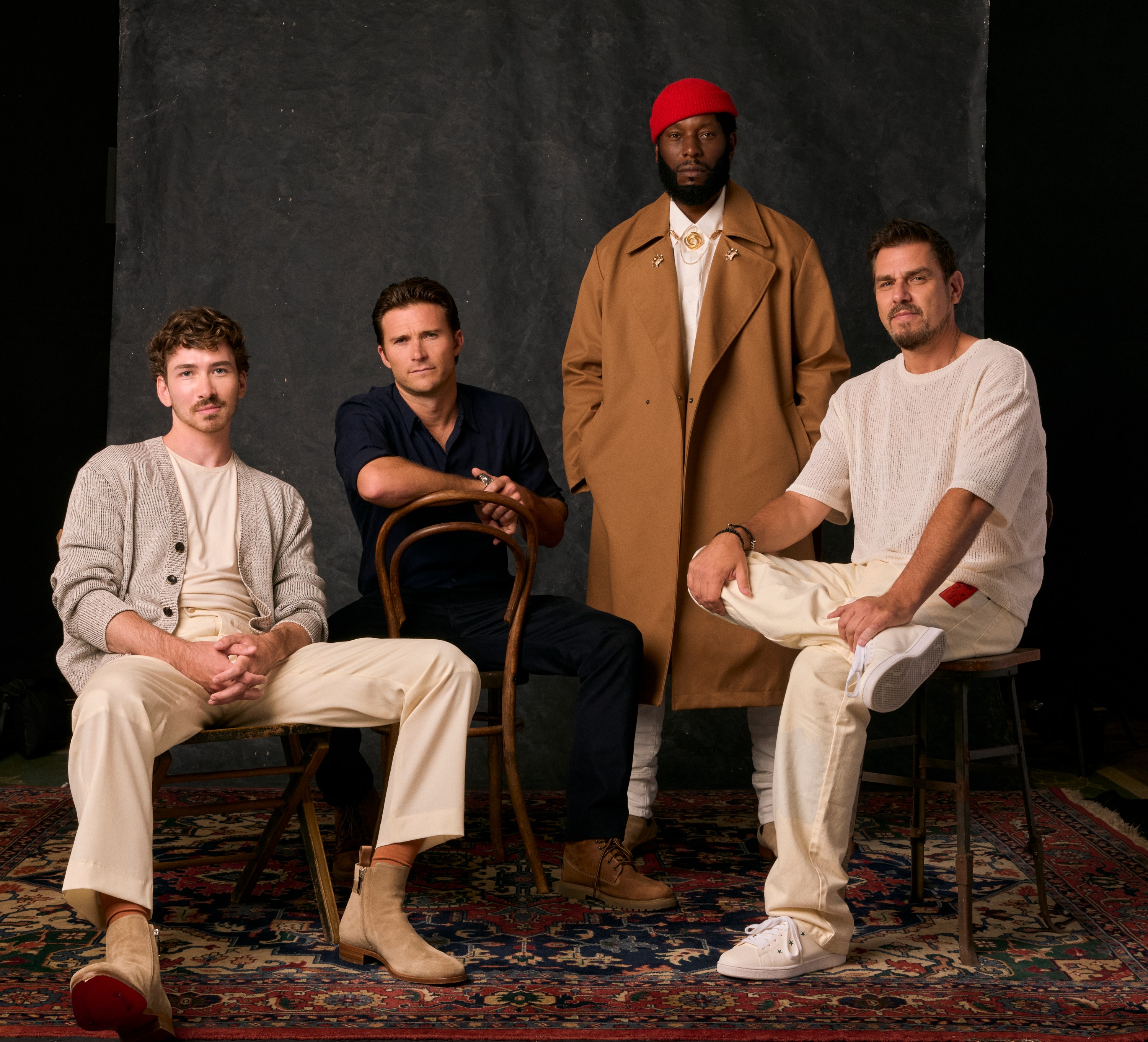
Can we start with taking a moment with Ray’s chair: How did it feel to hold that space and remember him?
VROMEN That was Ray. He would probably laugh at us for doing it, but it’s emotional. I spoke a lot about him today, and when you speak about somebody, you kind of bring them back to life. You’re seizing memories. There was a lot of Ray in the questions and the interviews, and now to have stood next to his chair and recall those memories, it brings mixed feelings of big gratitude that we had the chance to be a part of that before he left us. But also there is pain in knowing that you cannot repeat that experience ever again.
Tyrese, what was the experience like for you?
GIBSON We’ve all promoted movies before, it’s what comes with our world. But we started to think about how we could do something to honor the sensitivities of this situation and find a balance of paying our love and respects, and tell stories but not appear gimmicky or that we’re trying to milk anything. This was our best way of wanting his presence to be felt. He was in that exact chair. I was late to the party, they were already in Bulgaria filming at the time when I arrived. When I got there, I noticed that he was always sitting somewhere completely in the dark because he didn’t want to be bothered. He was running his lines and eating the script alive. He had a marker, one reading light — that’s why we had the reading light there attached to the chair on the right side — and you almost couldn’t see his face until you walked all the way up to him because he was in the dark. He was mean as hell. But he was, in my mind, very Method, very focused, very much like if my character doesn’t get along with your character, stay out of my section.
What was that like?
GIBSON To be honest with you, there are some people that are very, very deep and dramatic and they go intense but later you will see them cracking jokes and having fun on set the whole time. When they hear “action,” they fucking lock in. I don’t know if Ariel told Ray to do that but it was uncomfortable for me the whole time. It felt like Ray saved everything for between “action” and “cut.” He was reserved but then when it came time, he was unpredictable and intense and let everything go until we were gone. … I remember being so scared to walk up to the chair. I didn’t even want to greet him.
VROMEN Tyrese is used to working on sets that probably have craft services with 400 people. He has a politician’s way of arriving to set and saying hello to everyone, introducing himself and be very connected. He came to say hello to Ray, and that was such a moment. I remember you were almost like a child, you were so nervous.
Ori Pfeffer, Dylan Arnold, Ray Liotta, Tosin Morohunfola, Scott Eastwood and Oleg Taktarov in 1992. Courtesy of Lionsgate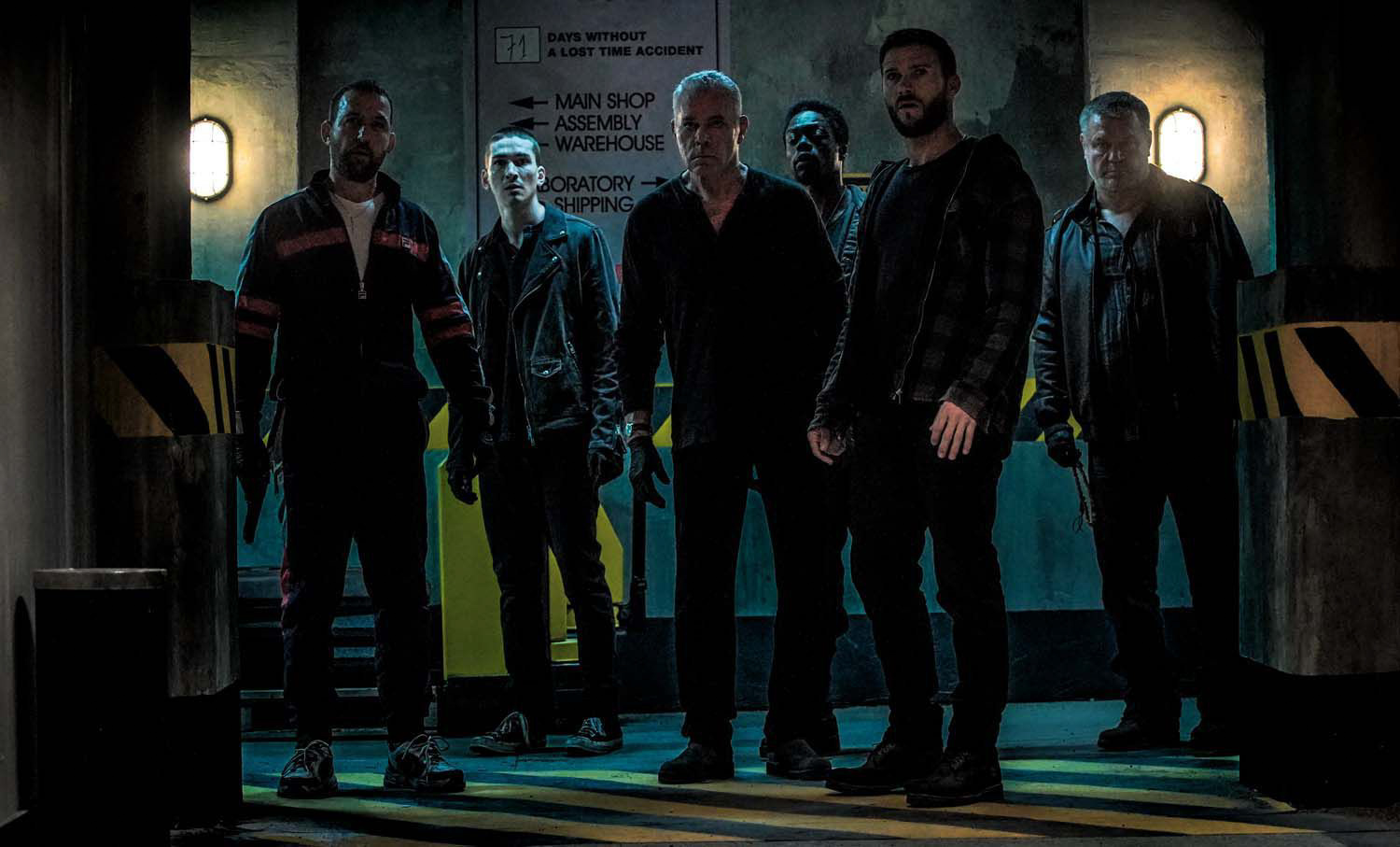
GIBSON First of all, the stuff that I’m mentioning about energy and Method and being mean, there’s no ill will to that. We’ve all worked with people, and we respect everyone’s process. I walked up and was like, “Hey, Ray, man, good to see you.” (Gibson pretends to be rejected.) Yeah, shit, OK, well, let me go back over here to my section. As you’ve seen in the movie, that tension and that energy and that lack of bonding showed up in the scenes. Maybe that shit wouldn’t have been that tense had we become buddies on set with small talk.
But I feel very lucky because our trailers were right next to each other. When Ariel announced that it was a wrap for Ray Liotta, we were all clapping and cheering. He put on his jogging suit to head to the airport. I got the last hug as he was getting in his car. He said, “You were great, man.” I was, like, “Oh shit, you were great, man. I didn’t know you had anything good to say about anything.” (Laughs.) He said, “You were great, man. Just stay at it. You’re doing your thing.” And we laughed and we hugged, and I walked off without ever knowing that it would be my last hug. What I’ve learned from losing people like John Singleton and Paul Walker is hug slower. Look people in the eyes, tell stories, greet, love, vibes because you just never know. We live in a very unpredictable world these days, man. So, with Ray Liotta, the pressure that we have been under is why not go as far as we can to make sure that everybody in the world can see the last piece of art he left us with.
Gibson as Mercer in 1992. Courtesy of Lionsgate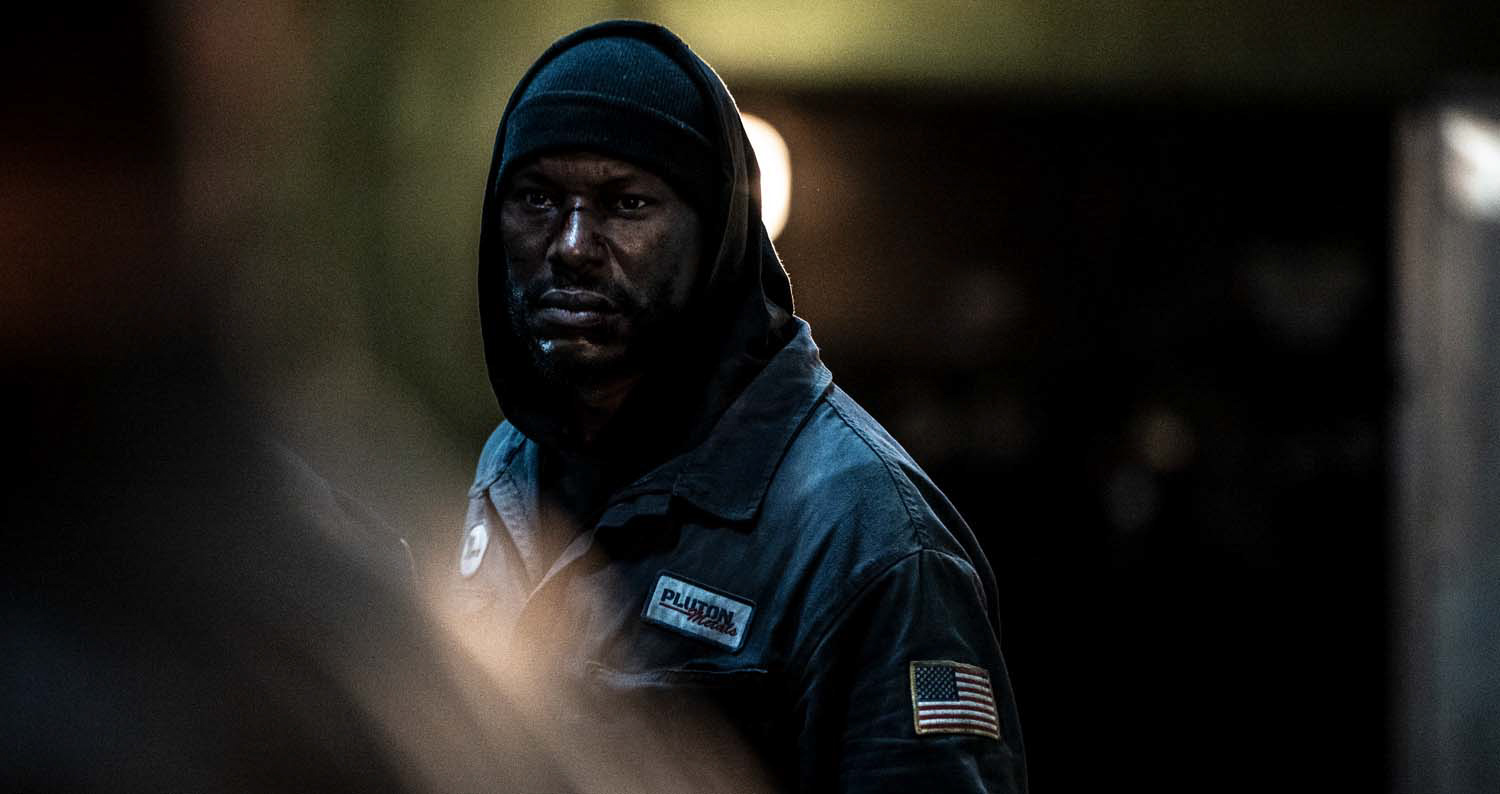
That’s beautiful. Dylan, you had a moment of lightness with Ray Liotta, too. Tell me about that.
ARNOLD Yeah. We were filming in the car one day, doing the same shot over and over again while driving by the factory. There was a moment every day when you would show up to work and say, “Good morning, Ray.” And he would be just like, “Yeah, hello!” Then you would go to work and that was about it. I would never try to talk to him. I wouldn’t approach him. I wouldn’t approach the king. I just let him do his thing. Then about two weeks into filming, we were sitting in the car and Scott got out and it was quiet. I didn’t try to make any conversation, but after a while he just turned around and said, “Dylan, you know, I like you.” I was like, “Oh, thanks Ray. I like you too.” And he goes, “You don’t try to talk to me.” And I was like, “Yeah, for sure, man.” And then we just sat in silence for another 10 minutes and I didn’t try to talk to him. I respected that he came to set and was about his work. He wanted to just experience it the way he wanted to experience it. I think it made it so rich and I felt like there was a mutual respect there. Ray Liotta saying, “Hey, man, I like you,” was a real highlight for me.
Arnold, who also had a role in Christopher Nolan’s best picture Oscar winner Oppenheimer. Leo Jacob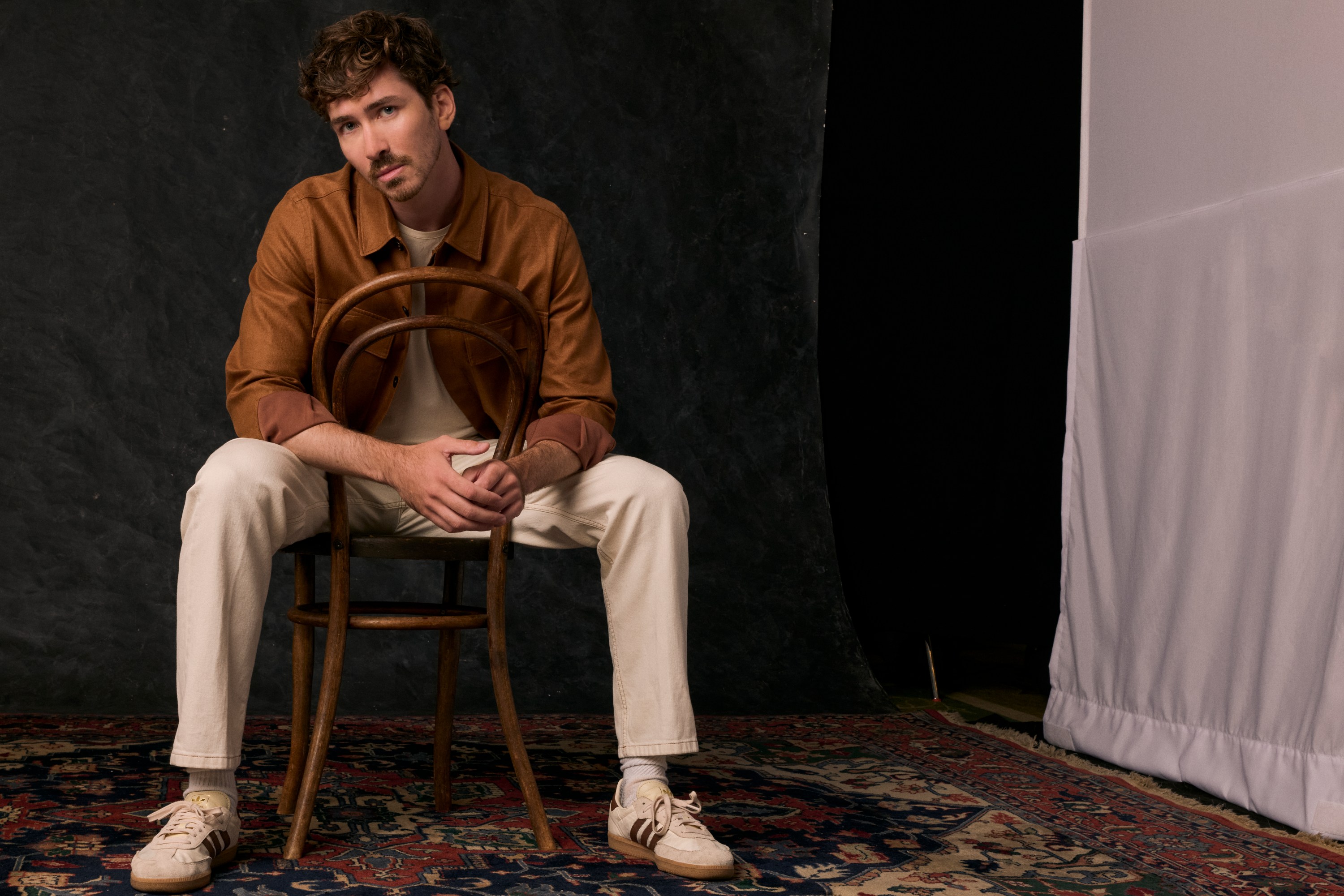
Scott, what appealed to you about this role?
EASTWOOD I liked that the characters are complex, that there was a father-son thing going on. It’s a very charged relationship between these three guys, [Ray Liotta’s character] and his two sons. I thought it was really interesting that my character is in the family business but he hates it and he wants out because he does not see eye-to-eye with his father’s values. They have a totally different set of values. That causes a lot of conflict in their relationship and I thought that was an interesting dynamic to explore. I also liked that it’s a heist movie, and I love heist movies. I loved The Town. I loved Den of Thieves. I love these hard-hitting heist movies that are grounded and I thought that this one could be like that.
What was Ray like as a scene partner? What was your relationship like on set?
EASTWOOD He was good. Ray is a no-bullshit kind of guy, and you know what you’re getting. He’s pretty strong and he brought that to set. He brought an intensity that really makes you uneasy, and that’s who his character was but he put you at ease. You can’t really like his character too much or you would be, like, “What the fuck?” You can’t ever feel comfortable around a character like that. You have to know that he’s a bad guy, he really is the heavy in this movie. On a personal note, it was an incredible experience to get to spend a summer with him, getting to know him and hear about his experiences and his journey in film. He worked with Martin Scorsese. It was such a great thing to hear his stories.
You said intense. Can you share an anecdote from the set that illustrates what you mean?
EASTWOOD He challenged Ariel a few times and if Ariel didn’t have an answer, it wasn’t a good thing. But if Ariel did have an answer, he was like, “OK, cool, I hear you.” He knows. He was very direct, and he would be very serious about the work. But then he would come back and crack a joke. He had a very irreverent sense of humor. I’ll always cherish that summer of getting to know him.
Eastwood in a tense scene as Riggin Bigby. Courtesy of Lionsgate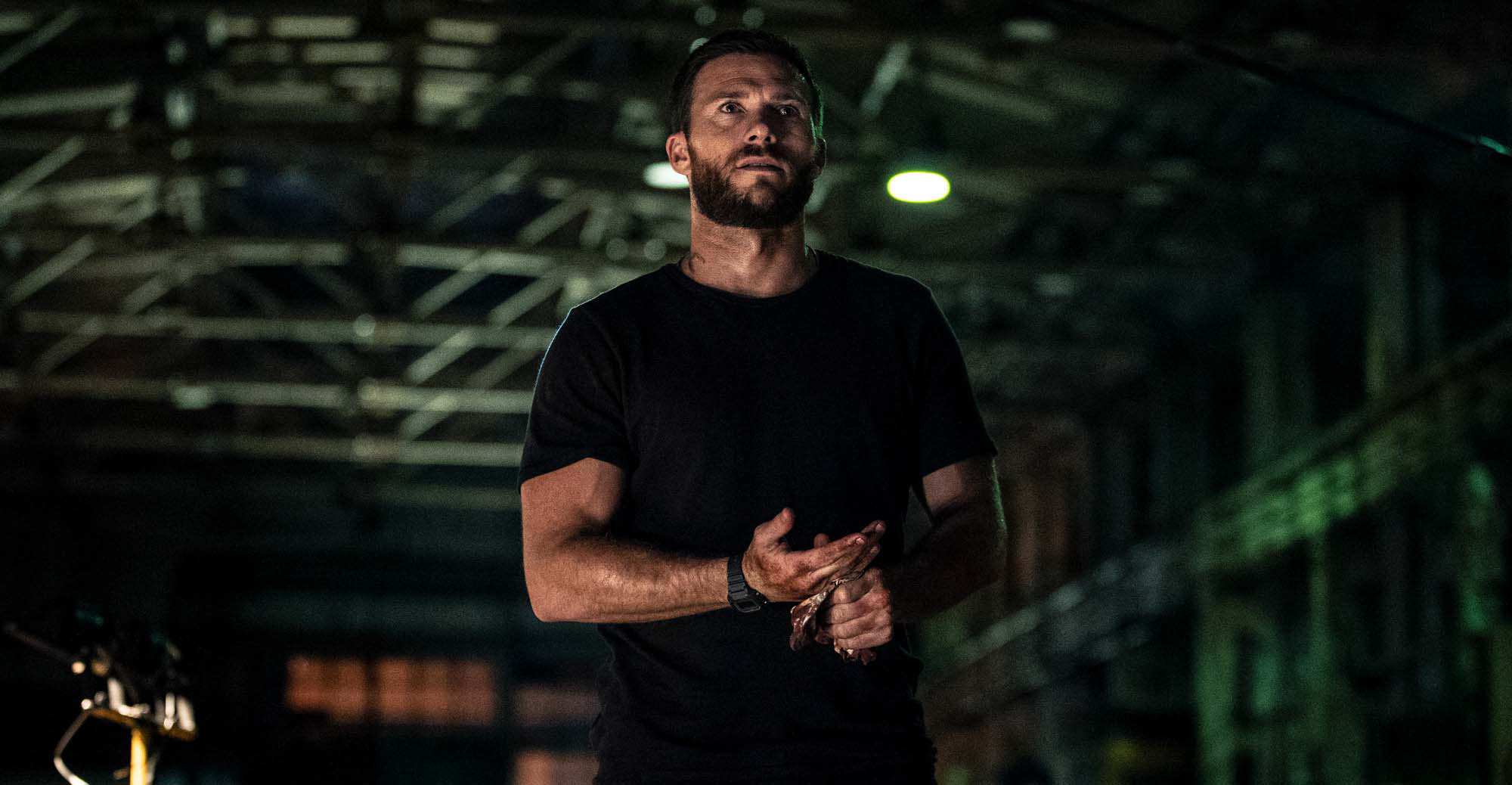
Liotta and Christopher A’mmanuel, who also starred on Black Lightning. Courtesy of Lionsgate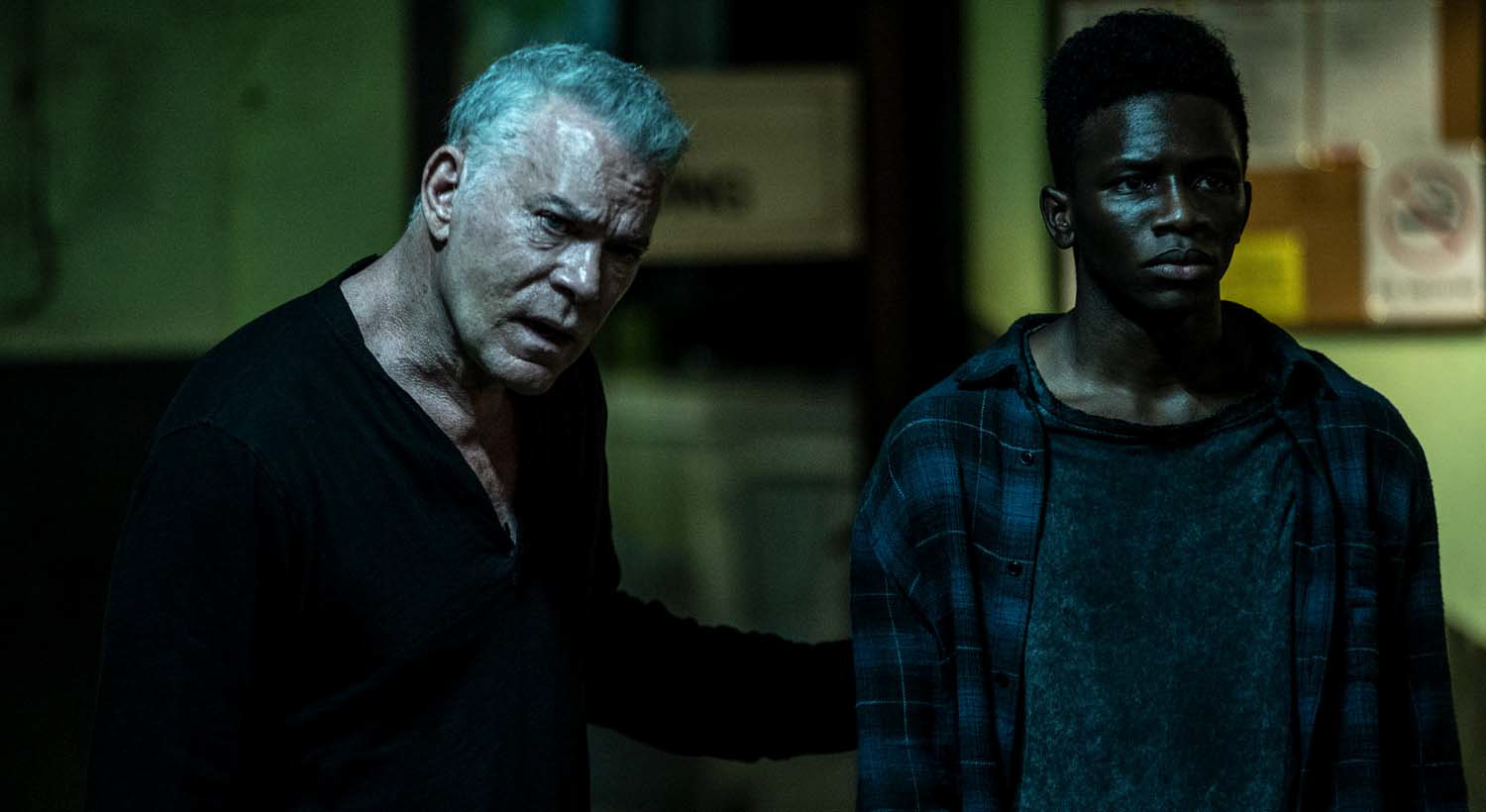
Ariel, I’m sure we could spend hours talking about your experiences with Ray. You go back with him to your film, The Iceman. Can you share a little bit about how he changed from that film to 1992, and how your relationship changed both as a director and as a friend?
VROMEN Ray was in my first scene on The Iceman on the first day of shooting. We shot in this office and he had this very convoluted scene with somebody blaming him for killing someone who was almost like a family member. There was a moment in the scene that I really needed Ray to stand and show kind of his menacing side. We’re doing two takes and after every take, I approached him and said, “Hey, man, I really like it but you would try one time of standing up because in that moment, I really need to feel your force.” He was like, you’re giving me acting directions? I saw that it was getting even more irritating that I had to say something so I said, “Listen, it’s my first day on this movie. It’s going to be kind of awkward for me if we’re going to have a hundred takes of this scene until I get one take of what I’m trying to do here.” He was very short with me in front of the entire set but on the third take, he stood up and did that moment and it was really, really strong. I was like, “Great, cut!” Then we moved on.
He stopped everybody and said, “Hold on.” He called me over and said that it felt great. He asked me to do another take so he could try something else and go even further. From that moment on, I realized that I have a partner. With that movie, Michael Shannon arrived later and I realized that if you have a very strong co-star, you always bring your star later because that way you’re setting the stage for everyone to bring their A-game without attracting certain energies.
Vromen first became friends with Liotta after directing him in 2012’s The Iceman opposite Michael Shannon, James Franco, Winona Ryder and Chris Evans. Leo Jacob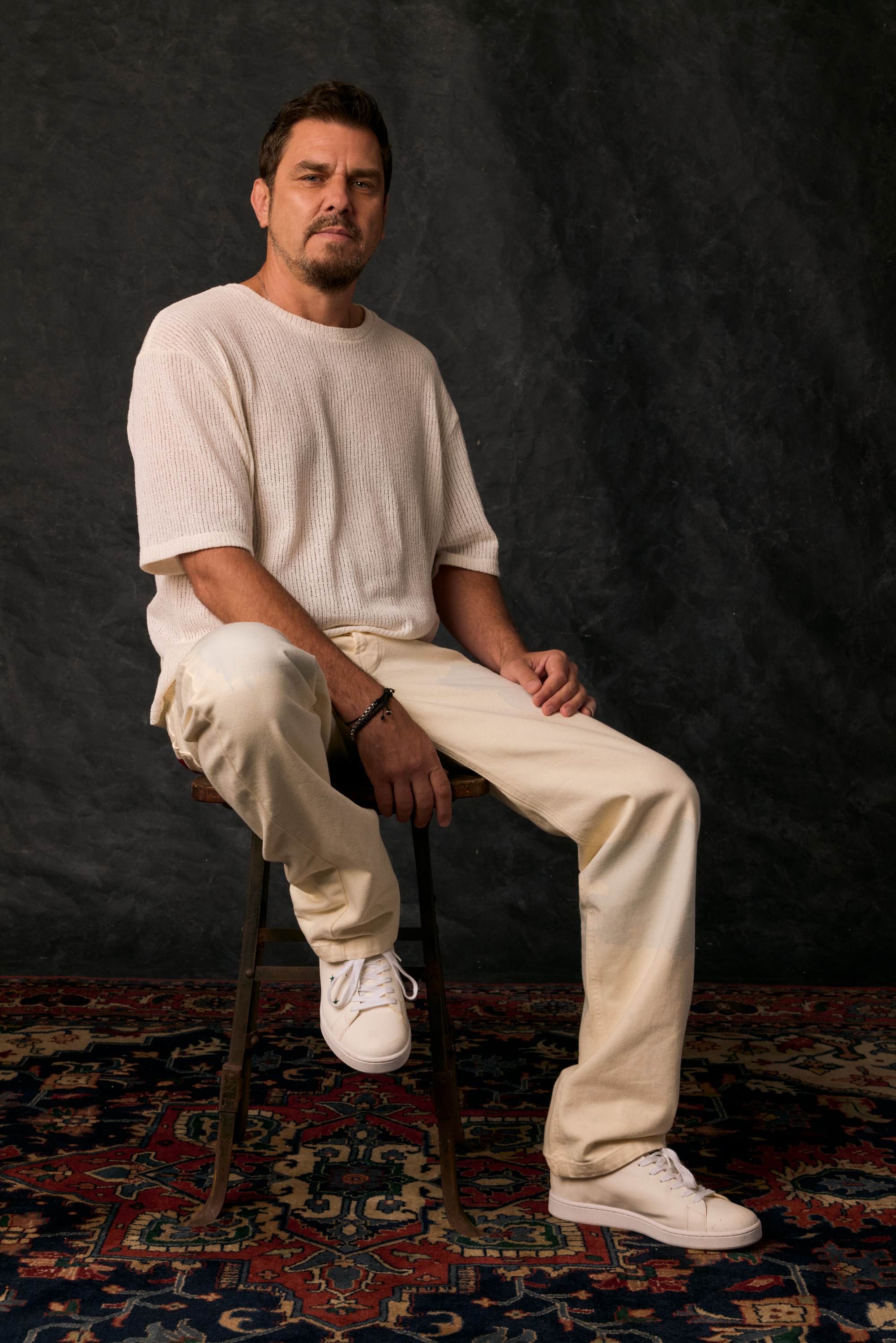
Tyrese, how does that feel to hear that? Because you’re the star and you arrived late to this movie, which finds you playing a much different character than we’re used to seeing. There’s no Tyrese flashing his megawatt smile …
GIBSON Well, not only did I not show my teeth, but Ariel had me had to dirty him up which was another 45 minutes in the trailer to make them dirty. I did not know what I was walking into. But my mom, rest in peace, always taught me to read the room. And one thing about me, I’ve always been very secure in my spot. I’m not Dylan, I’m not Scott, I’m not Ariel, I’m not Ray. But while I was there, it’s like a nest. A cast and a crew is a nest. I was just trying to identify my twigs. What is my color? What is going to be my approach to contribute to the magic of this cast? We’re all goons. Trying to be as menacing as Ray won’t land. Just fucking find your spot and find your voice and find your vibration. When we left the set, I realized that none of us was ourselves hanging out with Ariel independent of the set. I didn’t know who this guy was because on set he was intimidating but off the set, he becomes the most charming, fun, charismatic guy ever.
Gibson takes a moment to remember Liotta. Leo Jacob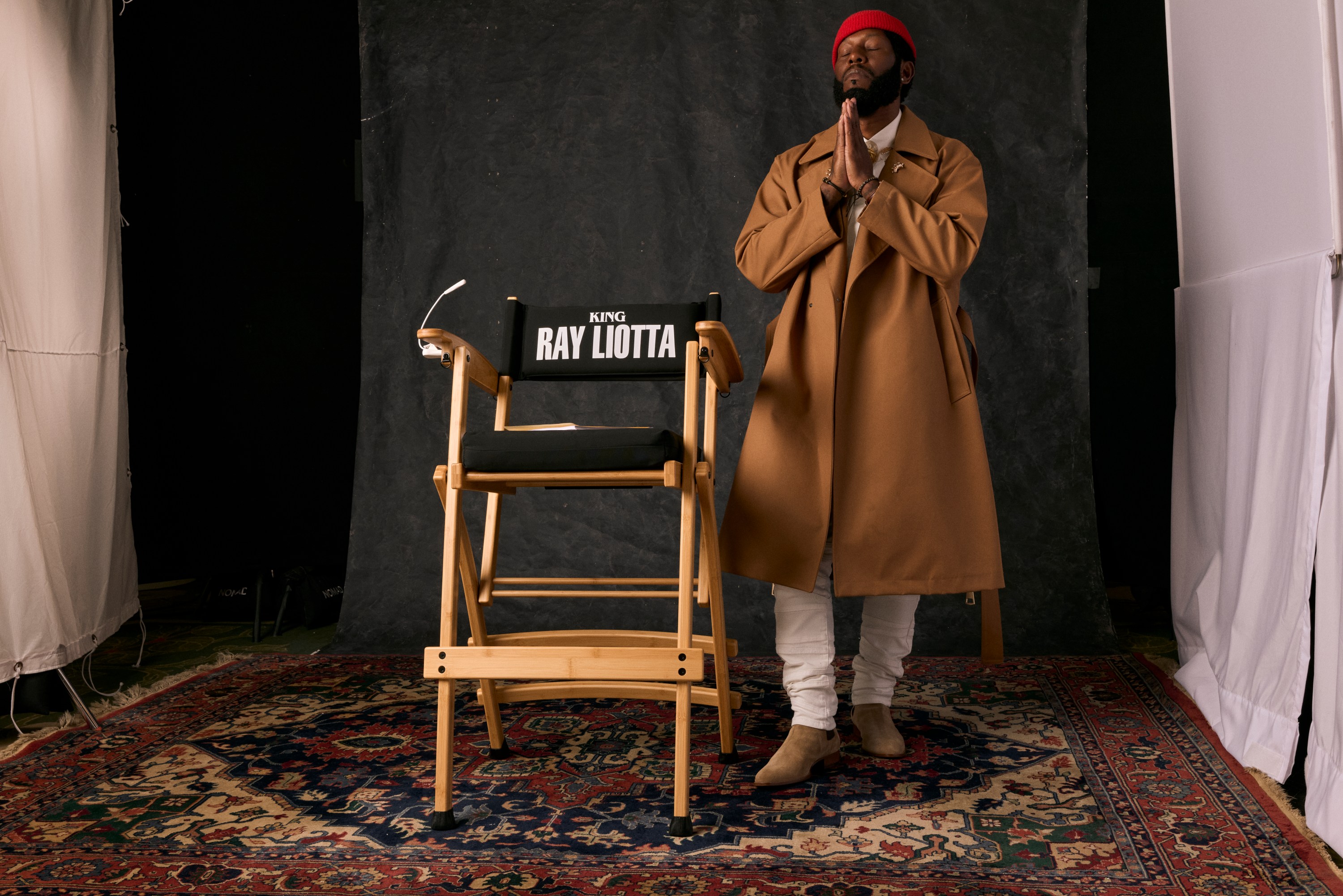
Ariel, what made you choose these actors?
VROMEN With Dylan and Christopher, those were decisions where you instinctively know when you watch an audition. It was during [the pandemic], so on-set casting was not even something that was possible. I remember watching all those tapes and when I hit both Dylan and Christopher’s tapes that it was something different with their performances. There was a certain authenticity and almost like a naivete that was needed for their characters. Christopher’s agents were really pushing and you could see that somebody was really believing in this guy. I hadn’t seen any of their work before, but I’ve watched all of the work they’ve done after which is kind of funny because since the movie was finished, they kept doing things and some even went to the Oscars. [Motions to Dylan in a reference to his role in Christopher Nolan’s best picture winner Oppenheimer.]
I knew Scott from before and was very close with him. The timing of it was very funny because he was staying at Tyrese’s house at the time because they know each other from before [working on the Fast & Furious franchise]. Three years ago, and I was at my mom’s house in Tel Aviv. She was still in the hospital, and I had just lost my dad to COVID. My mom was in intensive care so I had been going through a really crazy time. George Floyd and Minnesota was still pumping through our veins and the concept of [revisiting the L.A. riots] was resonating. When Tyrese and I started to talk, I had no idea that he was from South Central. Of course, I was familiar with him as a big superstar and his work in Baby Boy, Four Brothers, Fast & Furious, Transformers and other movies.
I told him that he was like a very expensive Lamborghini that was stuck in the garage. It was time to go crazy and get down and dirty. When he told me about his authentic relationship to the character in terms of his upbringing and his childhood story, it made sense. Sometimes people will pitch you options for actors and there will be some obvious names that you get. I don’t want to name names but I’ll use an example of Idris Elba. Think about having a guy from Manchester plowing through South Central? With Tyrese, I felt like I literally had found a diamond in the rough because how do you find a guy like that who can carry a movie star attitude and name value but is still a perfect choice for this movie? It’s very rare that you have that.
Gibson as Mercer surveys an L.A. street taken over by riots. Courtesy of Lionsgate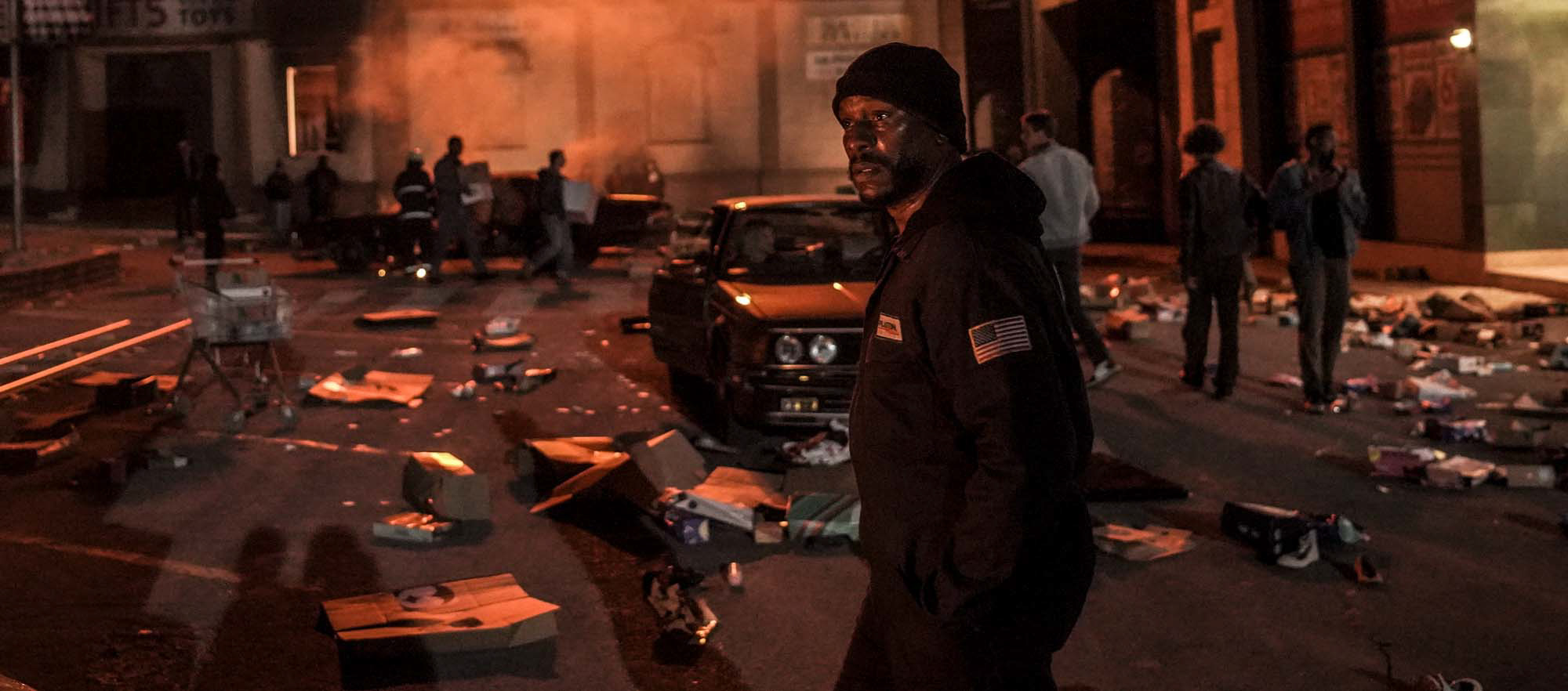
GIBSON I just feel very humbled and grateful and blessed. It doesn’t matter where we were on the call sheet, everybody rocked in this movie. If you know anything about South Central, you will know that the first movie ever was Colors with Don Cheadle and Sean Penn. Then you get into Menace II Society with the Hughes brothers [Allen and Albert Hughes]. Then you got Boyz n the Hood, Baby Boy, Poetic Justice, Straight Outta Compton, Snowfall. There has never been a cast more diverse than 1992. Whenever you see white people in South Central films, they’re always evil or racist police officers fucking us up. Everything about this heist and the conflict between the brothers and the father — I’ve got my son and I’m the father — and it’s all happening at this place where my character works, I was like, my God, this movie has to be made. It has to be made about this dark historical moment.
As this movie goes out into the world, what do you hope fans take away from it, both as a film and for the memory of Ray Liotta?
VROMEN In the years before he passed, he did a few rom-coms and some [police procedural TV shows], but a lot of people discovered Ray back in the days of Goodfellas. [With 1992], we’re going back to a good, down-and-dirty, raunchy, off-the-charts role that is going to be the last performance of Ray Liotta on the big screen. It’s kind of like a full circle back to Goodfellas.
ARNOLD You’re going to see another iconic Ray Liotta performance. It feels like that gritty, villainous thing that he does so well. I think audiences are going to really, really enjoy seeing him return to his roots.
Ariel Vromen, Dylan Arnold, Tyrese Gibson and Scott Eastwood. Leo Jacob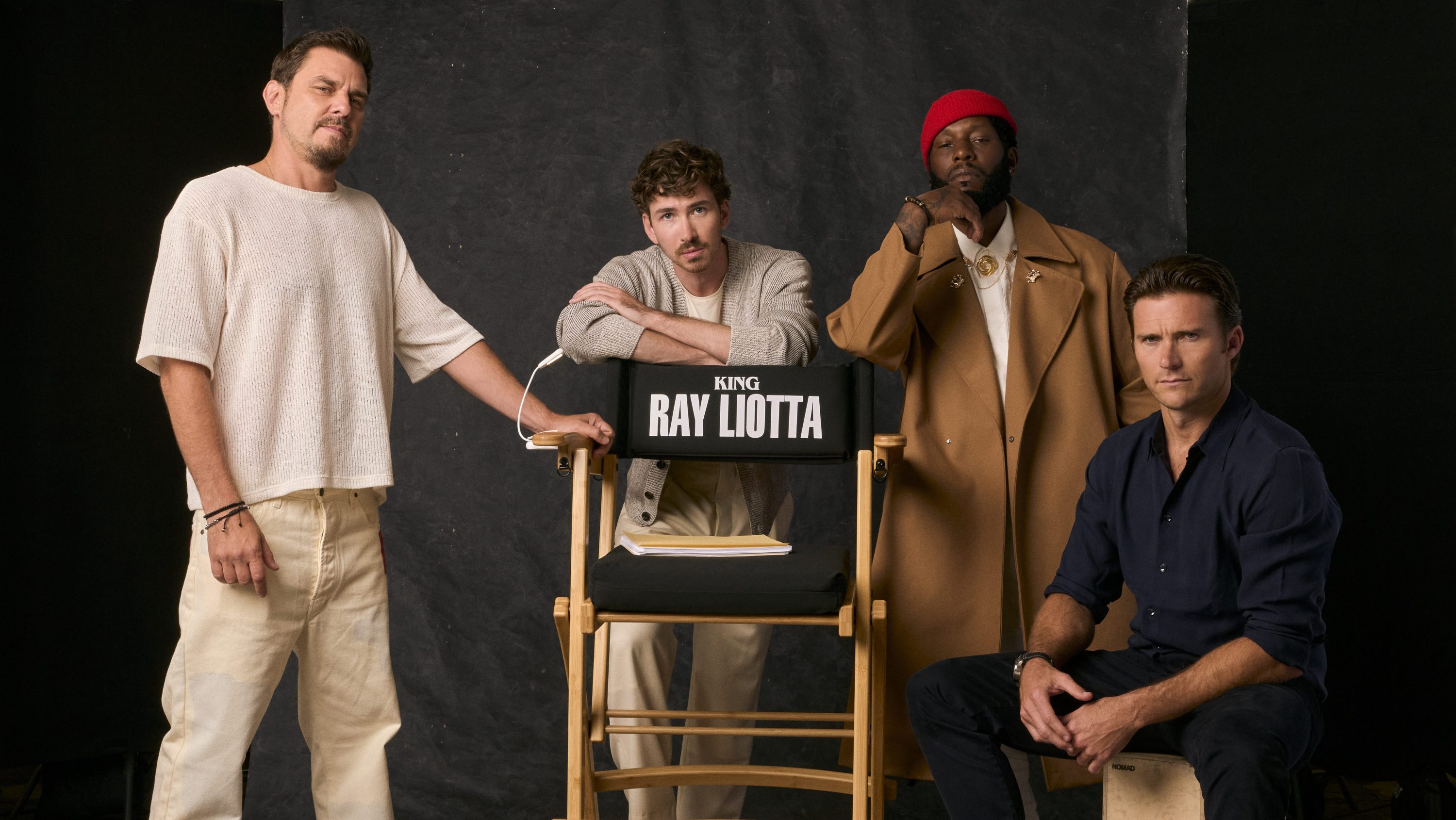
Source: Hollywoodreporter
Related Posts
- Roundball Rocked: With NBA Return Looming, NBC Purges Scripted Roster
- SoundCloud Says It “Has Never Used Artist Content to Train AI Models” After Backlash on Terms of Service Change
- Fox News’ Camryn Kinsey Is “Doing Well” After Fainting on Live TV
- Kerry Washington and Jahleel Kamera in 'Shadow Force.'
Courtesy of Lionsgate
…
- This Alternative Artist Landed a Top-20 Chart Debut With an Album Made Almost Entirely on His Phone





